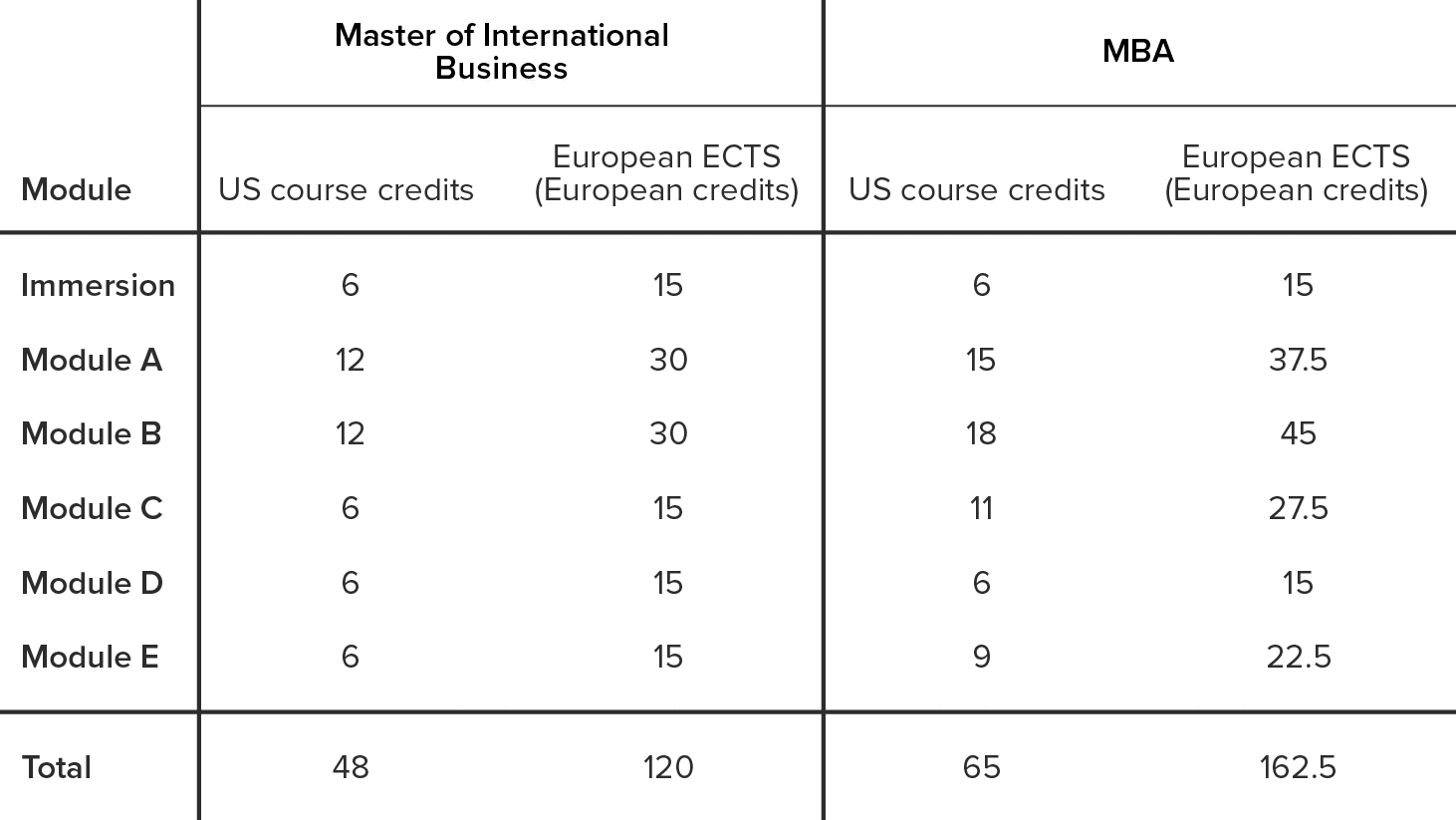So you know you want a career in international business. You know you want a one-year business degree. But which one? Master of International Business or MBA? When we first start speaking to students about which program they’re interested in, we often find they’re unsure about the differences and which one is best for them.
Here, we break down the differences and similarities between our Masters in International Business (MIB) and our Global One-Year MBA programs, and the typical student profile that best suits each program.
MIB vs MBA student profile
The simplest way to describe the differences between the two programs is the typical background of students. Most MBA programs require a minimum of three years’ work experience, whereas Master of International Business programs are open to those with no work experience.
This means that the average age of students on MBA programs tends to be higher than those taking a Master of International Business degree. At Hult, the average age of MBA students is 31, with an average of 6 six years work experience. Our MIB students have an average age of 24 and 1 year’s work experience.
In terms of diversity of nationalities, all our programs had students from more than 130 nationalities with a spread of students from all regions of the world.
Credits and academic rigor
Hult’s Master of International Business program is worth 48 credits and our Global MBA is worth 65 credits. This is because the MBA requires you to complete more courses than the MIB, within the same time period.


There is the assumption that, having worked in industry for at least three years, and, in most cases, having taken the GMAT, students on an MBA program will have a deeper level of business and subject knowledge. For example, MBA students are expected to have a working knowledge of finance.
In many cases the actual courses and the subject matter across the two programs are very similar, if not identical. So there is no difference in the academic value of the courses themselves, or the manner in which they’re taught. The difference lies in the level at which students are able to engage with the material as this is dependent on the amount of on-the-job experience they have.
International experience
The amount of international experience offered will depend on the school but at Hult, our Master of International Business and MBA programs enable students exactly the same choice. Students are able to study at up to any three of our six campus locations. They chose one campus to complete there core course – San Francisco, Boston, London, or Dubai – and then have the option to take electives at a further two locations – Shanghai and New York.
“Hult sent me to three campuses: London, Dubai, and Shanghai. It challenged me to visit nine countries, and saw me interact with people from over 100 cultures. Never has my life been so transformed in the space of a year.” – Xiwen Wang, China/U.S., MBA 2015, Operations Analyst. MBK Homes LLC
We also find that students learn as much about business culture across the globe and working in cross-cultural teams from their classmates as they do from being on the ground in a different country. This is due to the spectacular diversity of our student body, across all programs. So, regardless of whether someone is studying for an MBA or an MIB, they are exposed to an array of international perspectives without even leaving the classroom.
“The student diversity at Hult is outstanding. It’s like you’re travelling the world without leaving the classroom. I could gain the perspective of someone from the United Kingdom, Canada, Angola, China, and Columbia – all in the same day.” – Michele Bianchi, Italy, Class of 2015, Analyst, Deloitte
Quality of faculty
As in most leading business schools, many of the same Hult faculty teach both Master of International Business and MBA courses. In many cases, the courses are very similar so professors seamlessly move from one program to another.
Some professors have more experience teaching one student demographic and this may be reflected in the classes they choose to teach. But, regardless of the program they’re on, all our students are taught by internationally renowned academics that bring years of business experience to the classroom and have a passion for teaching.
“The professors are respected professionals with successful careers in both business and academia, and the balance of both perspectives creates a unique and vibrant classroom environment.” – Milena Ivanova, Bulgaria, Class of 2015, Talent Enablement Partner EMEA, Hewlett Packard
Choice of electives and specializations
Hult’s Master of International Business and MBA programs both offer students the ability to specialize in their chosen area of business. Students can choose three electives in a particular area and graduate with a specialization. Hult’s MIB and MBA programs offer specializations in the same five areas: International Marketing, Finance, Disruptive Innovation, International Business, and Business Analytics.
“My goal after graduating from Hult’s Master of International Business program was to forge a career in marketing. My choice of electives focused on marketing and proved very rewarding – I am now a Marketing Manager.” – Sofia Lundstedt, Sweden, MIB Class of 2013, Marketing Manager, PGA European Tour Sweden
MIB and MBA students at Hult have the same breadth of choice of electives. Not all electives are offered at all campuses, so students may well choose their electives based on where they want to study, as well as what they want to study. As all our campus locations are open to students on both programs, the range of choice of electives is unaffected by program, although not all electives are offered to both MIB and MBA students.
Some examples of electives available on both programs include:
- Digital Marketing and Social Media
- Solutions Marketing
- Behavioral Finance
- Adding Value Through Sustainability
- Fundamentals of the Global Energy Business
- Disruptive Business Models
- Project Planning and Execution
- Project Quality and Risk Management
- International Negotiations
- Management, Strategies, and Business Models for Emerging Markets
Practical work experience
The opportunity to gain practical work experience may be particularly important to Master of International Business students if they have limited experience prior to starting the program. But for those MBA students wanting to switch careers, hands-on, practical application of knowledge and skills is equally important.
At Hult, students on both programs participate in a real-world project that is suited to students typical level of work experience: the Hult Business Challenge. Students spend 7 months working with a leading corporation to solve their real business problem, or get a startup idea ready to bring to market. It’s safe environment where students can apply everything they’ve learned in the classroom, learn from their mistakes, and build on their successes.
“The Hult Business Challenge project was an exciting, hands-on experience, and an invaluable lesson in teamwork.” – Marc Seipp, Germany, MIB 2013, Management Consultant, PwC
Every year, Hult students from both the MIB and MBA programs work with a different corporation to solve a current problem they’re facing that requires an innovative, strategic solution. Previous clients have included IBM, Philips, and Unilever and covered topics such as artificial intelligence, e-commerce, and sustainability. This year, students are working with Johnson & Johnson’s disease interception department to tackle how to most effectively bring interceptive treatments to market.
Simulations and experiential learning techniques
“[We] learned not only how to apply financial, marketing, research, operations, and management strategies, but also how to approach business problems holistically.
“The marketplace simulation provided real-life implications of business decisions and how competitive market forces, government regulations, inflation, exchange rates, interest rates and so on, affect a firm’s success. It brought to light everything we had done during our program.” – Norbert Ogochukwu, Niger, MBA Class of 2014, Assistant Vice President, State Street in London
Both Hult’s Master of International Business and MBA programs use simulations and immersive, experiential techniques to bring learning to life and enable students to apply theories to real-world situations. As the MBA program is more condensed, it may be that the longer, more complex simulations take place over a shorter period of time than on the MIB program. The depth of experience of MIB students might also dictate that the simulations be slightly less complex than those undertaken by MBA students.
Leadership development
Leadership development programs will differ considerably from school to school. Whereas most leading MBA programs will include a leadership element, not all Masters programs will. At Hult, we believe that learning leadership skills should be an integral part of all graduate business programs. That’s why we’re taking the award-winning leadership skills program from our MBA program and incorporating it into our Master of International Business program.
“Hult’s unique approach to the development of managerial and soft skills, along with a multicultural approach to being successful in a globalized labor market, really makes it stand out.” – Javier A. Cuellar, Columbia, MBA Class of 2013, Assistant Vice President, State Street London
Hult interviewed 100 of the world’s leading CEOs to find out if business school graduates arrived in the workplace with the right skills. The 18 soft skills deemed critical by the CEOs we interviewed form 3 core competencies: Interpersonal Influence, Team Collaboration, Adaptive Thinking.
Students work on developing observable skills across these competencies. Skills such as persuasively selling an idea, coaching team mates for performance and growth, and seeing underlying patterns in complex situations. Their progress is systematically measured throughout their entire degree program.
If you’re still undecided about which program you are most suited to, the best thing to do is contact the school to discuss your personal profile. You can contact Hult at anytime and we’ll be happy to talk through our programs with you.
Download a brochure or visit Hult’s main website to find out more about the Masters in International Business Program and Global One-Year MBA.
Find out more about how Hult uses simulations in the classroom in this article.
Read about Hult’s award-winning approach to Leadership Skills.
You can read about differences between our Global MBA programs in EMBA vs MBA article. The one-year vs two-year MBAs article highlights the pros and cons of each.
Make the most of what your career has to offer with a Masters in International Business from Hult. To learn more, take a look at our blog My first year in review – An Executive MBA Adventure. Or give your employability a huge boost with an MBA in international business. Download a brochure or get in touch today to find out how Hult can help you to explore everything about the business world, the future, and yourself.


